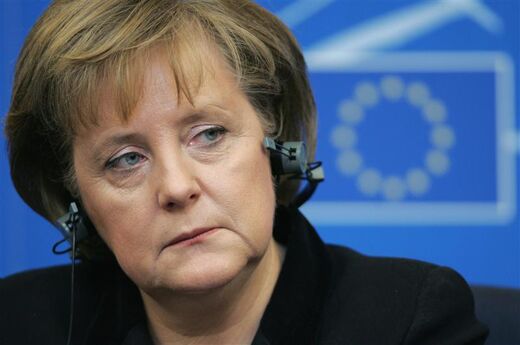
Berlin Bullies Europe on Constitution
We were warned. In the months leading up to Germany’s six-month EU presidency, oodles of reports emerged about Berlin’s plan to revive the EU constitution—a document that has been at an impasse since French and Dutch voters rejected it in mid-2005. German Chancellor Angela Merkel said her presidency of the European Union would breathe new life into the constitution and draw up a road map for getting it implemented Europe-wide. It would be this, Merkel said, or a “historic crisis” in the EU.
Well, now that Germany’s actually in the driver’s seat, we see it acting in blitzkrieg fashion to push its agenda through. While most other EU presidencies have floundered in rhetoric and minutiae, Berlin is undeniably making its presence felt. Other nations are being warned to stay out of Berlin’s way.
For example, on January 26, Luxembourg—one of the two nations to have ratified the constitution by referendum—held a meeting on the constitution. This was to be the first of two meetings (the second to be held in February) concerning the future of the charter. But it called off the second meeting so as “to avoid the ‘impression’ of working against the German EU presidency …” (EUobserver.com, January 23). Luxembourg’s foreign minister said: “It emerged that maybe we give the impression of disregarding the presidency.”
Where would they get the idea that it might undermine Germany? From Germany. “Although Germany has publicly welcomed the first ‘friends of the constitution’ meeting in Madrid this week, EU diplomats say Berlin was unhappy particularly with the second meeting in February, which was scheduled just before the signing of a major declaration on the EU’s 50th birthday in March” (ibid.). Germany sees the 50th-birthday declaration as key to rallying public opinion to the constitution and more importantly to the idea of a united Europe.
Another EUobserver.com article stated, “Although Germany has continually stressed that its success in getting the constitution back on track depends largely on the will of other member states, it has also said it does not feel it has to be apologetic about its agenda” (January 25). German is certainly acting on that feeling.
While Luxembourg was backing down on its constitution-revival plans, Germany’s Foreign Minister Frank-Walter Steinmeier asserted that Members of the European Parliament would have no major role in the constitution’s revival, “warning deputies not [to] pick fights with national governments over who serves Europe better or overshadow Berlin’s efforts to revive the EU charter” (op. cit.)
Steinmeier bluntly stated: “Let us not discuss things in an atmosphere of opposition.” In other words, Let’s not get in a situation where we’re hearing everyone’s opinion. Berlin can handle this, thank you. “We need to place trust in one another for a few months,” he added. Meaning: Just trust the Germans while we’re in charge.
Several days later, Steinmeier sent a stern warning to France not to let the campaign leading up to the country’s presidential elections in April turn into EU constitution bashing. That too would go against Germany’s will for Europe. A socialist contender in the race, Ségolène Royal, has said she would like the treaty to be put to another referendum. This prompted Steinmeier to state: “It would be good if in countries where elections are due that the EU constitution doesn’t become such a central topic where firm political positions are taken.”
Don’t put ideas in the people’s heads that go against our wishes, Steinmeier is telling the French. We are going to get this done our way, and we don’t want the voters getting all confused by socialist propaganda. These leaders are acting as if the only appropriate bias for Europeans to hear is German bias.
The bullying isn’t just coming from Steinmeier. A January 26 EUobserver.com article reported that Merkel herself sent a letter to Sweden telling Stockholm how it could get around having a referendum on the constitution. Political activists want the letter to be made public. If that were to happen, then perhaps we could more clearly see Germany’s true colors in wanting to bypass the democratic process and thrust its will on Europe.
These are worrying signs coming from Germany. They verify the warning former British Prime Minister Margaret Thatcher issued back in October 1995: “You have not anchored Germany to Europe; You have anchored Europe to a newly dominant, unified Germany. In the end, my friends, you’ll find it will not work.”
Read our booket Germany and the Holy Roman Empire to learn where, according to biblical prophecy, Germany is destined to lead Europe in the future, and how its actions will have a dramatic impact on this world very soon.
